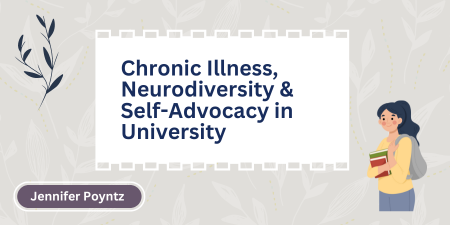Asking For Workplace Accommodations When You Have A Disability
- GetAHEAD Blog: Self-Advocating at Work
- GetAHEAD Blog: Skills Summary as an Online Tool for Young People!
When you’re starting a new position within the world of employment, it can be frightening to speak up about your needs.
Usually, we can get so caught up in wanting to impress a potential employer during an interview, that we can neglect mentioning any accommodations we may require, in an attempt to succeed in getting a job offer.
When you have a disability, you may have experienced a lot of neglect towards your needs by society. A lack of general accommodations for those with physical or cognitive disabilities can suggest that we are causing employers extra stress when we ask for assistance.
The reality is, in order to achieve our highest potential and satisfaction levels within an employment position, those of us with disabilities may need alterations to the general job specifications or requirements.
There is nothing wrong with needing a slightly more personalised role, than what was originally set out by the employer for that particular position.
A bit about me:
My name is Lauren McBride. I’m 25, and I have already worked in 8 previous job positions, since my teenage years.
I have ADHD, and dyspraxia.
The fear of rejection from my employer caused me to neglect asking for accommodations within the workplace. As commonly coexisting with ADHD, self confidence issues, people pleasing tendencies, lack of knowledge about my rights as an employee, and attempts to ‘mask’, took over more than actually considering my needs as an employee.
I’m writing this blog for AHEAD to help and encourage you to speak up for yourself, so you don’t forget your worth, and can navigate the world of employment a little easier for it.
Part 1: Confidence in your right to accommodations and acceptance
When applying for a new job:
Remember, job specifications and requirements are a general set of suggestions for employers to lay out visually what they are looking for in an employee.
Initial specifications are of course subject to change and adaptations. Each individual, whether they have a disability or not, will always need some changes to the original laid out expectations. The first step is remembering that there is nothing wrong with individuality within your position, and a good employer will always accommodate your needs.
‘But what about if I never spoke about my needs and potential accommodation requests to my current employer?’
That is a common and valid experience. I’d like you to know that it’s never too late to speak to your manager, supervisor, or someone you trust about your personal needs. See AHEAD's Guide to Disclosure to support you in considering whether or not to share information about your disability with your employer.
Although it may be nerve-wracking at first, it is essential that you remember that you will excel within your position with the right adjustments for you!
You are asking for accommodations for the sole reason of supporting yourself to be good at your job, whether you are fully convinced of your potential or not. (Imposter syndrome can play a huge part here!).
A good employer who cares about the wellbeing of their staff will always try to have a conversation with you to see what your requests are regarding accommodations, in a non-judgmental and caring way - and frankly, you deserve nothing less than this response.
Part 2: Finding what accommodations would suit you within your position
Learning what accommodations suit you isn’t always a straightforward process. For this, I suggest you sit down with yourself and write out or imagine a scenario in which you see yourself succeeding to your highest potential in your chosen position.
I’d recommend asking yourself the below questions:
- What could my employer implement for my personal journey within the workplace, that would make it easier for me to succeed day to day?
- What could make me feel more confident and accommodated?
- What type of weekly layout of objectives would ensure I don’t feel overworked, or miss days due to burnout or stress?
Doing your own research can always be beneficial too, and AHEAD has many resources for this including some information on workplace accommodations and the relevant legislation regarding reasonable accommodations.
I will also list some examples of accommodations that are necessary for those with different types of physical or cognitive disabilities, below. Don’t worry if none of these sound like something that you may need, there are many other accommodations personal to you, that you will think of as you go along.
Examples of some accommodations you could need, as someone with a disability:
- Wheelchair accessible offices - including accessible workstations, restrooms, or relevant assistive technology (discover assistive technologies that may suit you on AHEAD’s AT Hive).
- Alterations to your working week - including time for adequate breaks, firm boundaries around over-time-work, or an alteration to hours worked per week.
- In-built accessibility features within Windows and Office365 suite such as Immersive Reader and Dictate.
- Providing sign language interpreters.
- A quiet area or sensory room.
- Text to speech programs or speech to text programs.
- Routine and structure - including a clear timetable, designated due dates, or an outline of daily expectations.
- Extensions or extra time to complete work.
- A private space to take necessary medications, for physical or mental health.
Part 3: How to ask for accommodations
There is no wrong way to ask for accommodations when an employer truly cares about the wellbeing of their employee.
- But in saying that, this is definitely the hard part.
There are several steps outlined below to assist in making this process easier.
- Step 1: Take some time to consider your needs, and the accommodations you’d like to ask for. (Please see Part 2 for some examples that may resonate with you).
- Step 2: Ask your employer when suits them for a private conversation. It’s always better to do this in person, or over video or phone call. This allows an open conversation, where ideas are given back and forth.
- Step 3: Take a deep breath. You’ve done most of the initial work, and you’re ready to express yourself in a safe environment.
- Step 4: Tell your employer your requested accommodations and give an example of how these will help you succeed in your position. It’s important here to give real life examples of how accommodations would help you day to day.
- Step 5: When the conversation is over, assess if you felt heard, and of course, express any extra points via email, or in person, about anything you may have forgotten, or additionally need.
Read more about self-advocating at work, the process of speaking up for yourself to get the supports that you are entitled to, in a blog by AHEAD’s Philip Carroll.
Part 4: Wellbeing and satisfaction throughout your employment journey
As you continue in your employment journey, the accommodations you need may change.
There are always times in our lives where we can take on additional work, or subsequently, need to minimise our working hours due to things like family obligations, mental health, or lifestyle changes.
There also may be changes in your mental or physical health, and abilities, over time. It is important to reassess your wellbeing and your satisfaction in your position, every few months or so.
Thinking about how the obligations of the position fit in with your needs, goals and lifestyle, should be considered every once in a while. This is especially important if you notice any changes in your feelings towards your position, or the willingness of the employer to accommodate your needs.
There is no shame in learning as you go, and it’s as natural for your position to change, as it is for you to change too. The hopeful take-away point from this blog is that you begin on your journey to feel comfortable with standing up for yourself.
And, I sincerely hope that when you need to speak up regarding your needs, expectations, and wellbeing, with bravery and intent, you are heard and validated, as you should be.
Best wishes for your journey, you got this!
Lauren
First published February 2024
Guest Blog Author: Lauren McBride
Lauren McBride is a 25 year old psychology graduate from Wicklow. She is passionate about advocating for Neurodiversity acceptance and mental health awareness. She runs her own mental health advocacy blog called 'HerThoughtsAndBrightColours' on Instagram for over 5 years.
Lauren hosts the podcast 'Let's Chat: ADHD' with ADHD Ireland, where she discusses all aspects of ADHD with a variety of wonderful volunteers each month. She hopes to improve inclusivity, and listen to the personal lived experiences of neurodiverse individuals.
Lauren hopes this blog will help both employers and employees to learn about necessary accommodations within the workplace, for those with disabilities.







